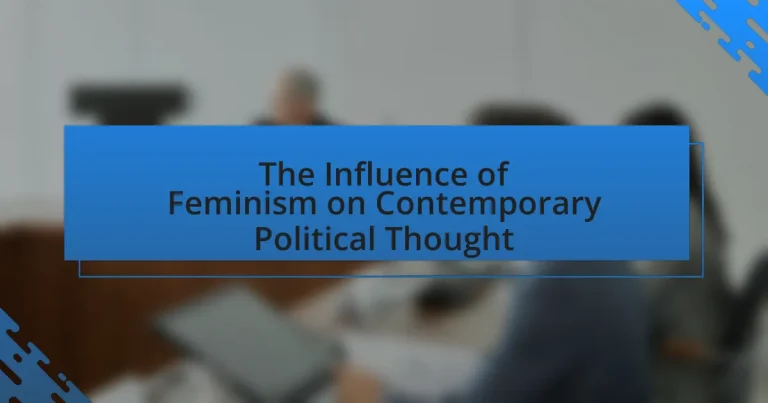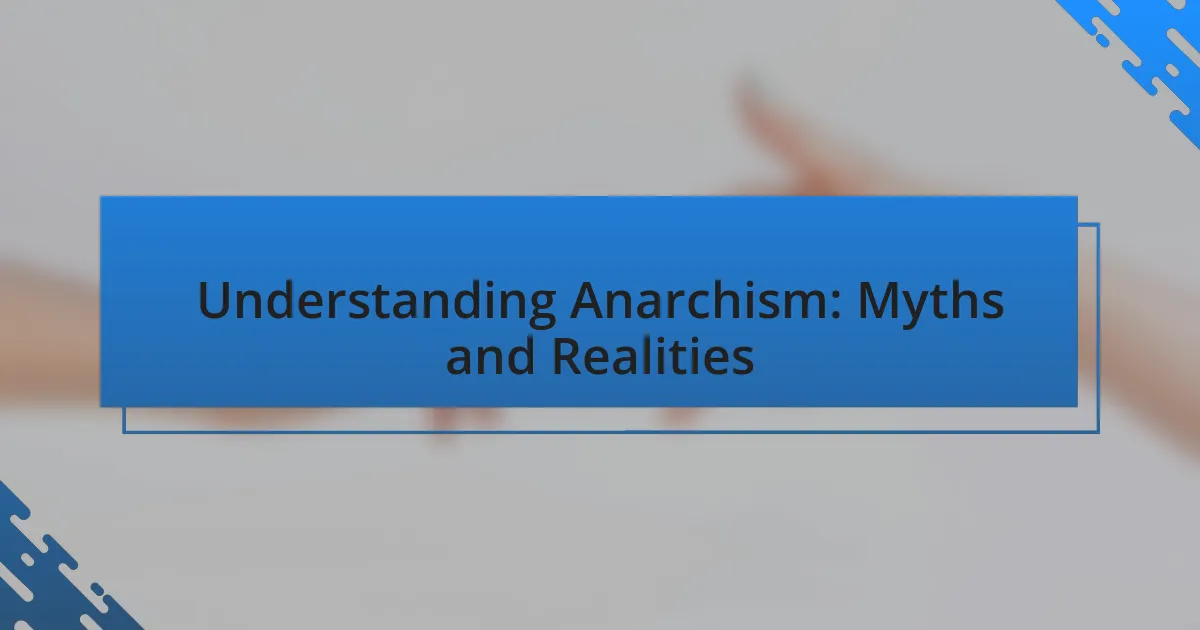The article examines the significant influence of feminism on contemporary political thought, highlighting its role in challenging traditional power structures and advocating for gender equality across various political ideologies, including liberalism, socialism, and intersectionality. It discusses key feminist theories, such as liberal, radical, socialist, and intersectional feminism, and their impact on modern political discourse and policy-making. The article also addresses the historical roots of feminism, the evolution of feminist movements through different waves, and the ongoing challenges faced by feminism in promoting inclusivity and addressing intersectionality within political frameworks. Additionally, it explores the relationship between feminism and other political ideologies, including socialism and environmental politics, while emphasizing the importance of education and grassroots activism in enhancing feminist influence in political institutions.
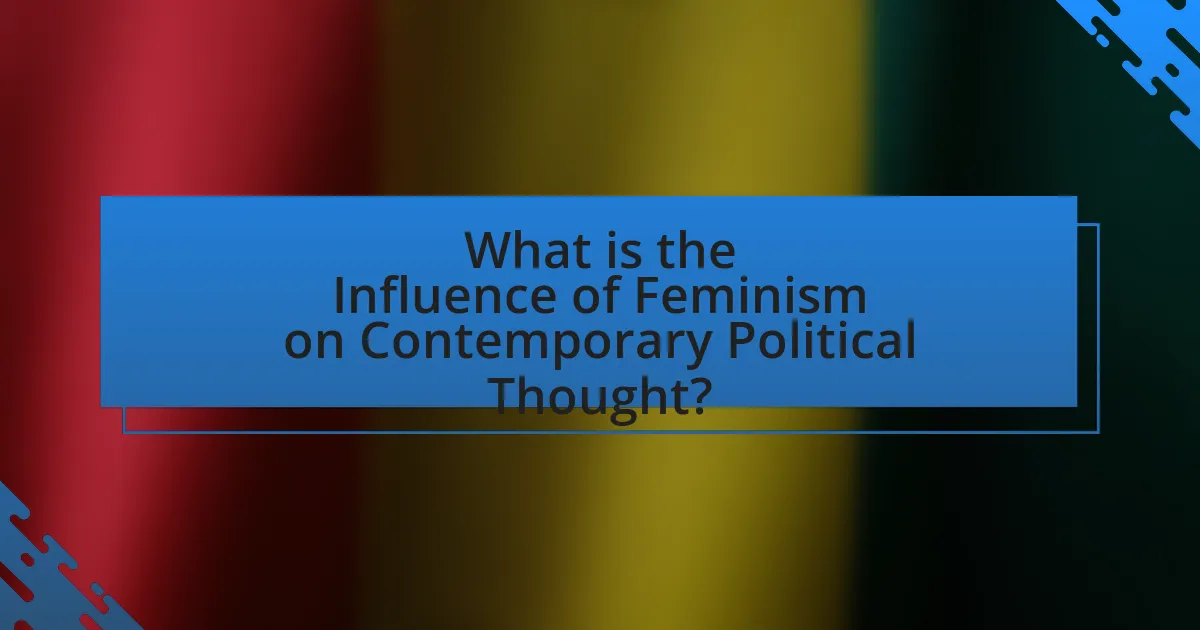
What is the Influence of Feminism on Contemporary Political Thought?
Feminism significantly influences contemporary political thought by challenging traditional power structures and advocating for gender equality. This influence manifests in various political ideologies, including liberalism, socialism, and intersectionality, which emphasize the importance of women’s rights and representation in governance. For instance, feminist theorists like Judith Butler and bell hooks have reshaped discussions around identity politics and social justice, arguing that gender intersects with race, class, and sexuality, thereby broadening the scope of political discourse. Additionally, the rise of feminist movements has led to policy changes, such as the implementation of gender quotas in political representation, which aim to rectify historical imbalances and promote inclusivity in decision-making processes.
How has feminism shaped modern political ideologies?
Feminism has significantly shaped modern political ideologies by advocating for gender equality and influencing policies related to social justice, human rights, and economic equity. The feminist movement has introduced concepts such as intersectionality, which examines how various forms of discrimination overlap, thereby enriching political discourse and prompting ideologies to address diverse experiences. For instance, the inclusion of women’s rights in the United Nations’ Sustainable Development Goals reflects feminism’s impact on global policy frameworks, emphasizing the necessity of gender equality for sustainable development. Additionally, feminist theories have challenged traditional power structures, leading to the incorporation of women’s perspectives in political decision-making processes, as evidenced by increased female representation in legislative bodies worldwide.
What are the key feminist theories influencing political thought?
Key feminist theories influencing political thought include liberal feminism, radical feminism, socialist feminism, and intersectional feminism. Liberal feminism advocates for gender equality through legal and political reforms, emphasizing individual rights and opportunities. Radical feminism critiques patriarchy as a systemic issue, seeking to dismantle male dominance in all aspects of society. Socialist feminism combines Marxist and feminist theories, arguing that capitalism and patriarchy are interconnected systems of oppression that must be addressed together. Intersectional feminism highlights how various social identities, such as race, class, and sexuality, intersect to create unique experiences of oppression, thus influencing political agendas and policies. These theories collectively shape contemporary political discourse by challenging traditional power structures and advocating for inclusive policies.
How do feminist perspectives challenge traditional political frameworks?
Feminist perspectives challenge traditional political frameworks by critiquing the inherent gender biases and power imbalances that often underpin these systems. Traditional political theories, such as liberalism and Marxism, frequently overlook women’s experiences and contributions, leading to a narrow understanding of justice and equality. Feminist theorists, like Judith Butler and bell hooks, argue that these frameworks must be re-evaluated to include diverse voices and experiences, emphasizing intersectionality and the social construction of gender. This critique is supported by empirical studies showing that inclusive policies lead to more equitable outcomes, demonstrating that traditional frameworks can be enriched and made more effective through feminist insights.
Why is understanding feminism important in contemporary politics?
Understanding feminism is crucial in contemporary politics because it addresses systemic inequalities and advocates for gender equity, influencing policy-making and social justice movements. Feminism has historically shaped political discourse, leading to significant legislative changes such as the Voting Rights Act and Title IX, which promote women’s rights and equal opportunities. Furthermore, contemporary feminist movements, such as #MeToo, highlight ongoing issues like sexual harassment and gender-based violence, prompting political leaders to prioritize these concerns in their agendas. By integrating feminist perspectives, policymakers can create more inclusive and equitable societies, ultimately enhancing democratic governance and social cohesion.
What role does feminism play in shaping public policy?
Feminism plays a crucial role in shaping public policy by advocating for gender equality and influencing legislative frameworks. Feminist movements have historically highlighted issues such as reproductive rights, equal pay, and violence against women, leading to significant policy changes. For instance, the introduction of the Violence Against Women Act in the United States in 1994 was a direct result of feminist advocacy, which aimed to address domestic violence and sexual assault. Additionally, feminist perspectives have contributed to the development of policies that promote workplace equality, such as the Equal Pay Act of 1963, which aimed to eliminate wage disparity based on gender. These examples illustrate how feminism not only raises awareness of gender-related issues but also drives concrete policy reforms that seek to create a more equitable society.
How does feminism influence political activism and movements?
Feminism significantly influences political activism and movements by advocating for gender equality and social justice, which mobilizes individuals and groups to challenge systemic inequalities. This influence is evident in various movements, such as the Women’s March, which emerged in response to perceived threats to women’s rights and has drawn millions globally, highlighting the power of collective action. Additionally, feminist theories have reshaped political discourse, emphasizing intersectionality, which recognizes how overlapping identities impact experiences of oppression, thereby broadening the scope of activism to include diverse voices and issues. Historical milestones, such as the suffrage movement, demonstrate how feminist activism has led to tangible political changes, including women’s right to vote, thereby reinforcing the critical role feminism plays in shaping contemporary political landscapes.
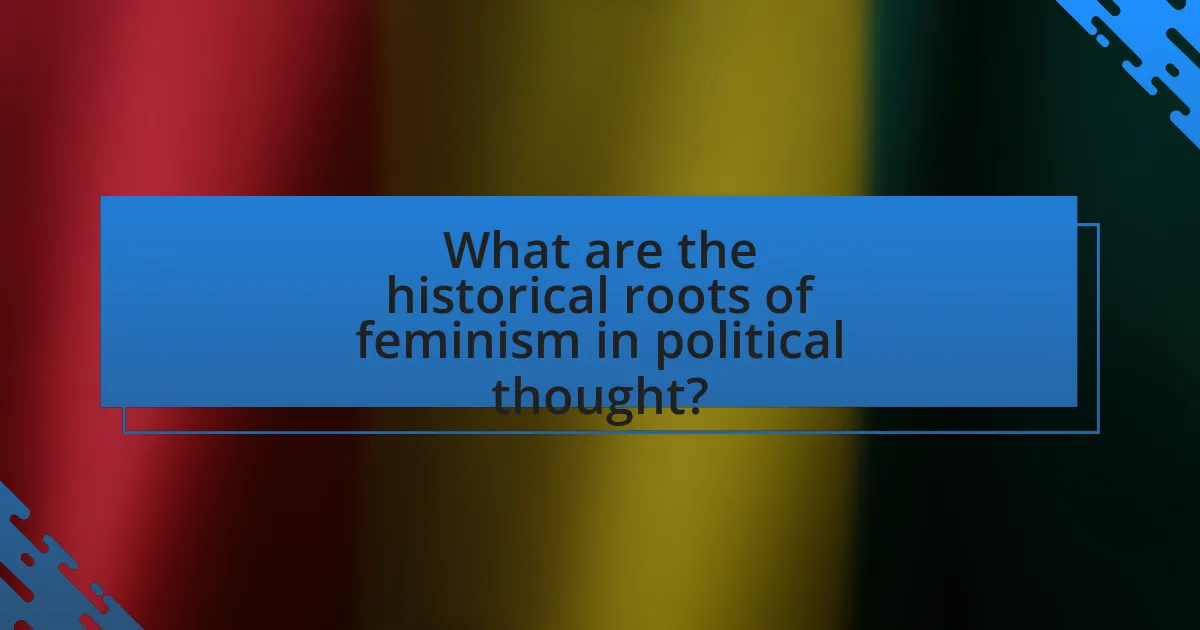
What are the historical roots of feminism in political thought?
The historical roots of feminism in political thought can be traced back to the Enlightenment period, particularly through the works of early feminist thinkers like Mary Wollstonecraft. Wollstonecraft’s seminal text, “A Vindication of the Rights of Woman” (1792), argued for women’s education and rationality, challenging the prevailing notions of female inferiority. This foundational work laid the groundwork for subsequent feminist political theories by advocating for equality and women’s rights within the framework of liberalism. Additionally, the suffrage movements of the late 19th and early 20th centuries further solidified feminism’s role in political discourse, as activists fought for women’s voting rights, emphasizing the importance of political participation in achieving gender equality. These historical developments illustrate how feminist thought has evolved and influenced contemporary political ideologies, advocating for social justice and equality.
How did early feminist thinkers contribute to political theory?
Early feminist thinkers significantly contributed to political theory by challenging traditional notions of power, authority, and citizenship. Figures such as Mary Wollstonecraft argued for women’s rights and education, laying the groundwork for the idea that women should have equal participation in political life. Additionally, thinkers like John Stuart Mill advocated for gender equality in his works, emphasizing the importance of women’s voices in shaping society. Their writings not only questioned the patriarchal structures of their time but also introduced concepts of justice and equality that have become foundational in contemporary political discourse.
Who are the prominent figures in the history of feminist political thought?
Prominent figures in the history of feminist political thought include Mary Wollstonecraft, Simone de Beauvoir, Judith Butler, and bell hooks. Mary Wollstonecraft, in her 1792 work “A Vindication of the Rights of Woman,” argued for women’s education and rights, laying foundational ideas for feminist theory. Simone de Beauvoir’s 1949 book “The Second Sex” explored the construction of women’s identity and the concept of “the Other,” influencing existentialist feminism. Judith Butler’s 1990 work “Gender Trouble” challenged traditional notions of gender, introducing the idea of gender performativity, which reshaped feminist discourse. bell hooks, through her writings such as “Ain’t I a Woman?” (1981), emphasized the intersectionality of race, class, and gender, advocating for a more inclusive feminist movement. These figures have significantly shaped feminist political thought and continue to influence contemporary discussions on gender and politics.
What historical events catalyzed feminist movements in politics?
The Seneca Falls Convention of 1848 catalyzed feminist movements in politics by marking the first organized effort for women’s rights in the United States. This event produced the Declaration of Sentiments, which outlined grievances and demands for women’s equality, including suffrage. Additionally, the suffrage movement gained momentum through key events such as the passage of the 19th Amendment in 1920, which granted women the right to vote, and the Women’s Liberation Movement of the 1960s and 1970s, which addressed broader issues of gender equality and reproductive rights. These historical milestones collectively shaped the political landscape, leading to increased representation and advocacy for women’s rights in various political spheres.
What are the different waves of feminism and their political implications?
The different waves of feminism include the first wave, second wave, third wave, and fourth wave, each with distinct political implications. The first wave, occurring in the late 19th and early 20th centuries, focused on legal issues and inequalities, primarily advocating for women’s suffrage, which led to significant political changes such as the right to vote in many countries. The second wave, emerging in the 1960s and 1970s, expanded its focus to issues of equality in the workplace, reproductive rights, and sexual liberation, influencing legislation like the Equal Pay Act and Title IX in the United States. The third wave, beginning in the 1990s, emphasized individualism and diversity, challenging the definitions of femininity and advocating for intersectionality, which has reshaped political discourse around race, class, and gender. The fourth wave, characterized by digital activism and the #MeToo movement, addresses sexual harassment and assault, pushing for systemic change in societal attitudes and legal frameworks. Each wave has contributed to evolving political landscapes by advocating for women’s rights and influencing policy reforms.
How do the goals of first-wave feminism differ from those of second and third waves?
First-wave feminism primarily focused on legal issues and inequalities, particularly advocating for women’s suffrage and property rights in the late 19th and early 20th centuries. In contrast, second-wave feminism, emerging in the 1960s, expanded its goals to include issues of sexuality, reproductive rights, and workplace equality, addressing broader social and cultural inequalities. Third-wave feminism, which began in the 1990s, further diversified the movement by emphasizing individualism, intersectionality, and the experiences of women of different races, classes, and sexual orientations, thus challenging the notion of a singular female experience. This evolution reflects a shift from legal and political rights to a more comprehensive understanding of gender and social justice.
What contemporary issues are addressed by current feminist movements?
Current feminist movements address issues such as gender-based violence, reproductive rights, workplace equality, and intersectionality. Gender-based violence remains a critical concern, with statistics indicating that one in three women globally experience physical or sexual violence in their lifetime. Reproductive rights are also a focal point, as movements advocate for access to safe and legal abortion, contraception, and comprehensive healthcare. Workplace equality is highlighted through campaigns for equal pay and the elimination of discrimination based on gender. Additionally, intersectionality emphasizes the need to consider how race, class, and other identities intersect with gender, as articulated by scholars like Kimberlé Crenshaw. These issues reflect the ongoing struggle for equity and justice within contemporary feminist discourse.

How does feminism intersect with other political ideologies?
Feminism intersects with other political ideologies by advocating for gender equality while addressing issues such as class, race, and sexuality. For instance, socialist feminism combines feminist and socialist principles, arguing that capitalism exacerbates women’s oppression, as seen in the works of scholars like Silvia Federici, who highlights the link between unpaid domestic labor and economic systems. Additionally, intersectional feminism emphasizes the importance of considering multiple identities, as articulated by Kimberlé Crenshaw, who illustrates how race and gender intersect to create unique experiences of discrimination. This intersectional approach has influenced various movements, including civil rights and rights, demonstrating feminism’s role in broader social justice efforts.
What is the relationship between feminism and socialism?
Feminism and socialism are interconnected ideologies that both seek to address and rectify social inequalities, particularly those related to gender and class. Feminism advocates for women’s rights and gender equality, while socialism emphasizes collective ownership and the redistribution of wealth to eliminate class disparities. Historically, socialist movements have often incorporated feminist principles, recognizing that women’s liberation is essential for achieving broader social justice. For instance, prominent socialist feminists like Clara Zetkin and Alexandra Kollontai argued that women’s oppression is linked to capitalist structures, advocating for both gender and economic equality. This relationship highlights the necessity of addressing both gender and class issues to create a more equitable society.
How do feminist socialists view the role of gender in class struggle?
Feminist socialists view gender as a fundamental axis of oppression that intersects with class struggle, asserting that capitalism and patriarchy are intertwined systems of exploitation. They argue that women’s labor, both paid and unpaid, is essential to the functioning of the capitalist economy, and that gender inequality exacerbates class disparities. Historical evidence, such as the work of scholars like Silvia Federici, highlights how women’s roles in domestic labor and informal economies are often overlooked in traditional class analyses, reinforcing the need for a feminist perspective in understanding class dynamics. This intersectional approach emphasizes that true liberation requires addressing both gender and class inequalities simultaneously.
What critiques do feminist theorists have of capitalism?
Feminist theorists critique capitalism primarily for its role in perpetuating gender inequality and exploitation. They argue that capitalism relies on the unpaid labor of women, particularly in domestic settings, which reinforces traditional gender roles and limits women’s economic independence. Additionally, feminist theorists highlight how capitalism commodifies women’s bodies and labor, often leading to exploitation in industries such as sex work and low-wage jobs. Research by Silvia Federici in “Wages Against Housework” emphasizes that the economic system undervalues reproductive labor, which is essential for sustaining the workforce. This critique underscores the intersection of capitalism and patriarchy, suggesting that true gender equality cannot be achieved without addressing the structural inequalities inherent in capitalist systems.
How does feminism interact with environmental and ecological politics?
Feminism interacts with environmental and ecological politics by emphasizing the interconnectedness of social justice and environmental sustainability. Feminist perspectives highlight how environmental degradation disproportionately affects women, particularly in marginalized communities, thereby advocating for inclusive policies that address both gender inequality and ecological issues. For instance, studies show that women are often the primary managers of natural resources in many developing countries, making their involvement crucial for effective environmental governance. This intersectional approach is evident in movements like ecofeminism, which critiques the patriarchal structures contributing to both gender oppression and environmental harm, advocating for holistic solutions that promote equity and sustainability.
What is ecofeminism and how does it influence political thought?
Ecofeminism is a philosophical and social movement that links ecological issues with feminist concerns, arguing that the exploitation of nature and the oppression of women are interconnected. This perspective influences political thought by advocating for policies that address environmental degradation while promoting gender equality, emphasizing that sustainable practices must consider social justice. For instance, ecofeminists argue that environmental policies often overlook the needs of marginalized communities, thus calling for inclusive approaches that integrate ecological sustainability with social equity. This intersectional approach has led to a re-evaluation of traditional political frameworks, pushing for a more holistic understanding of power dynamics in environmental and social contexts.
How do feminist perspectives contribute to discussions on sustainability?
Feminist perspectives contribute to discussions on sustainability by emphasizing the interconnectedness of social justice and environmental issues. These perspectives highlight how gender inequalities exacerbate environmental degradation and advocate for inclusive policies that address both ecological and social dimensions. For instance, research shows that women, particularly in developing countries, are disproportionately affected by climate change due to their roles in resource management and economic dependence on natural resources. By integrating gender analysis into sustainability frameworks, feminist perspectives promote equitable resource distribution and empower marginalized communities, ultimately leading to more effective and sustainable environmental solutions.
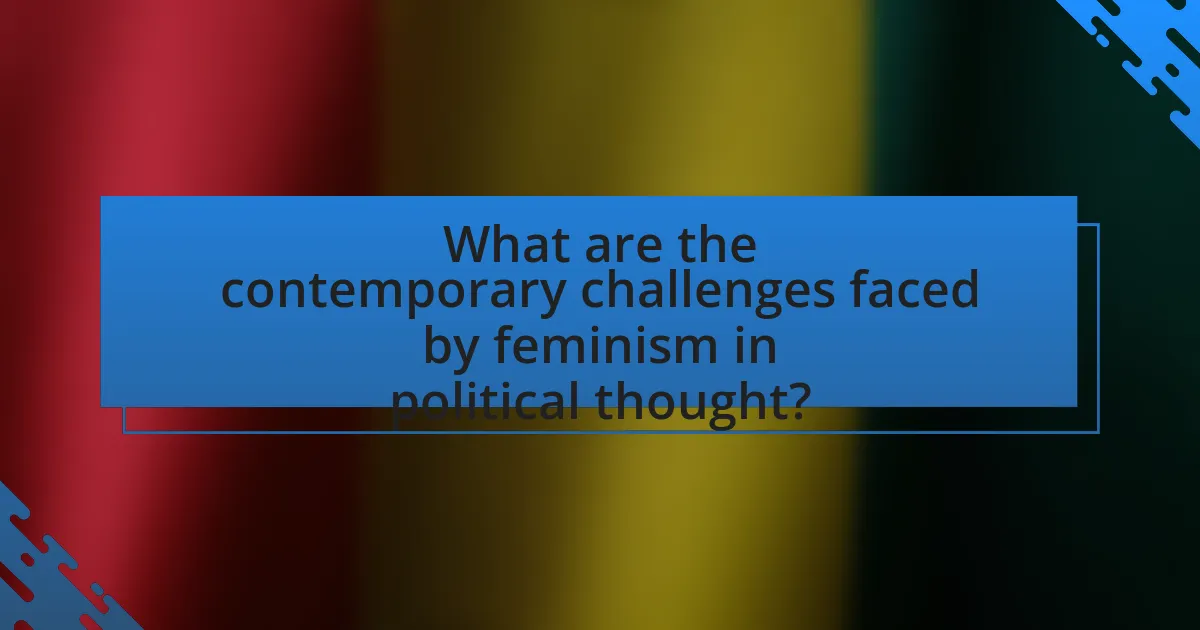
What are the contemporary challenges faced by feminism in political thought?
Contemporary feminism in political thought faces several challenges, including intersectionality, backlash against feminist movements, and the need for inclusivity. Intersectionality highlights the complexities of identity, as feminist theories must address the diverse experiences of women across race, class, sexuality, and other social categories. The backlash against feminist movements is evident in rising anti-feminist sentiments and policies that seek to undermine gender equality, as seen in various political contexts globally. Additionally, the demand for inclusivity requires feminist political thought to evolve and incorporate voices from marginalized groups, ensuring that feminism does not become a monolithic narrative. These challenges necessitate ongoing dialogue and adaptation within feminist political discourse to remain relevant and effective.
How do intersectionality and diversity impact feminist political discourse?
Intersectionality and diversity significantly shape feminist political discourse by broadening the understanding of women’s experiences and challenges. Intersectionality, a term coined by Kimberlé Crenshaw, emphasizes that women’s identities are multifaceted, encompassing race, class, sexuality, and other social categories, which influence their experiences of oppression and privilege. This perspective encourages a more inclusive feminist discourse that recognizes the varied realities faced by different groups of women, rather than a monolithic view of womanhood.
Diversity within feminist movements fosters a richer dialogue that addresses the specific needs and concerns of marginalized communities. For instance, the inclusion of voices from women of color, individuals, and those from lower socioeconomic backgrounds has led to a more comprehensive analysis of systemic inequalities. Research by the Women’s Media Center indicates that diverse representation in feminist discourse leads to more effective advocacy and policy-making, as it reflects the complexities of societal issues. Thus, intersectionality and diversity not only enhance the depth of feminist political discourse but also drive more equitable solutions in addressing gender-based injustices.
What challenges arise from differing feminist perspectives on race and class?
Differing feminist perspectives on race and class create challenges such as fragmentation within the feminist movement and the risk of marginalizing voices that do not align with dominant narratives. Intersectional feminism, which emphasizes the interconnectedness of race, class, and gender, highlights that traditional feminist frameworks often overlook the unique experiences of women of color and those from lower socioeconomic backgrounds. For instance, Black feminists like bell hooks argue that mainstream feminism frequently prioritizes the issues of white, middle-class women, thereby neglecting the systemic inequalities faced by women of diverse racial and economic backgrounds. This oversight can lead to a lack of solidarity and shared goals among feminists, ultimately hindering collective action and progress toward gender equality.
How can feminism address issues of inclusivity in political movements?
Feminism can address issues of inclusivity in political movements by advocating for intersectionality, which recognizes that individuals experience overlapping social identities that affect their access to power and resources. This approach encourages political movements to consider the diverse experiences of women, including those based on race, class, sexuality, and disability. For instance, the 2017 Women’s March in the United States highlighted the importance of inclusivity by bringing together various marginalized groups, emphasizing that women’s rights are human rights. Research by Kimberlé Crenshaw, who coined the term “intersectionality,” illustrates how traditional feminist movements often overlook the unique challenges faced by women of color and other marginalized identities, thereby reinforcing the need for a more inclusive framework in political activism.
What strategies can be employed to enhance feminist influence in politics?
To enhance feminist influence in politics, strategies such as increasing women’s representation in political offices, fostering grassroots activism, and promoting feminist policy agendas can be employed. Increasing women’s representation is crucial; for instance, countries with higher percentages of women in parliament, like Rwanda with over 60%, have seen significant advancements in gender equality legislation. Grassroots activism mobilizes communities and raises awareness about feminist issues, exemplified by movements like #MeToo, which have reshaped public discourse and policy. Additionally, advocating for feminist policy agendas, such as equal pay and reproductive rights, can shift political priorities and create systemic change, as seen in the implementation of gender-responsive budgeting in various nations. These strategies collectively strengthen the feminist voice in political arenas.
How can feminist activists effectively engage with political institutions?
Feminist activists can effectively engage with political institutions by advocating for policy changes, participating in electoral processes, and forming coalitions with other social movements. By lobbying for legislation that addresses gender inequality, such as the Equal Pay Act, activists can influence lawmakers directly. Additionally, running for office or supporting feminist candidates helps ensure that women’s perspectives are represented in decision-making bodies. Collaborating with other movements, such as racial justice or environmental groups, amplifies their impact and broadens the support base. Historical examples, like the Women’s March in 2017, demonstrate how collective action can lead to significant political discourse and policy attention.
What role does education play in promoting feminist political thought?
Education plays a crucial role in promoting feminist political thought by providing individuals with the knowledge and critical thinking skills necessary to understand and challenge gender inequalities. Through curricula that include feminist theories, historical contexts, and the contributions of women to political discourse, education fosters awareness of systemic oppression and empowers students to advocate for social change. Research indicates that educational programs that incorporate feminist perspectives lead to increased engagement in activism and policy-making among students, as evidenced by studies showing that women who receive feminist education are more likely to participate in political processes and support gender equity initiatives.
What practical steps can individuals take to support feminist political initiatives?
Individuals can support feminist political initiatives by actively participating in advocacy campaigns and voting for candidates who prioritize gender equality. Engaging in local and national organizations that promote women’s rights, such as the National Organization for Women, can amplify efforts to influence policy. Additionally, individuals can educate themselves and others about feminist issues, fostering informed discussions that challenge societal norms. Supporting women-owned businesses and initiatives also contributes to economic empowerment, which is a key aspect of feminist political goals. Research shows that increased representation of women in political positions leads to more comprehensive policies addressing gender disparities, highlighting the importance of individual actions in driving systemic change.
